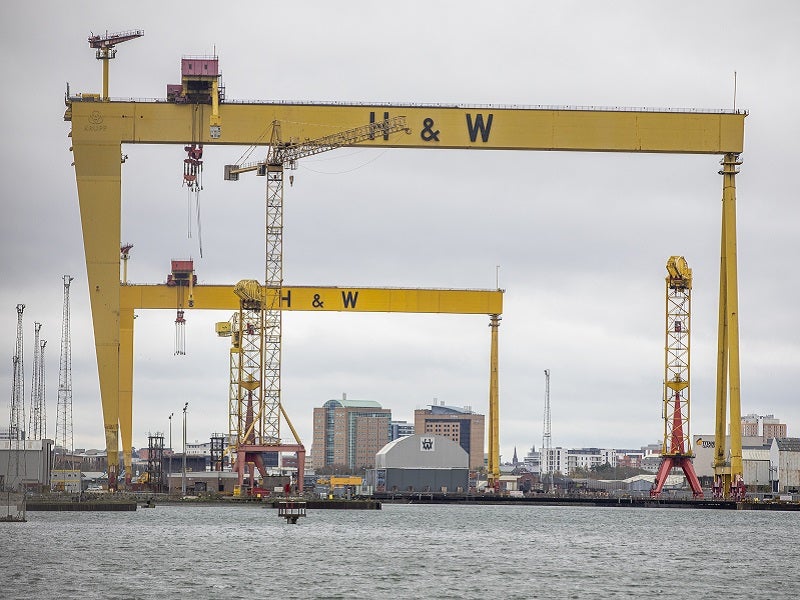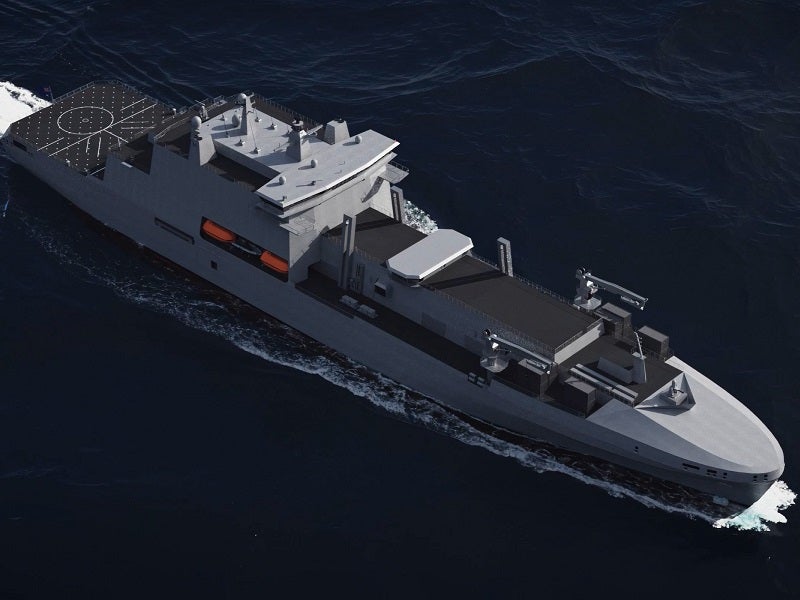
Generating the required workforce at Harland & Wolff’s shipyards as part of the plan to manufacture three logistics vessels for the UK’s Royal Fleet Auxiliary (RFA) under the Fleet Solid Support (FSS) programme has been highlighted as a key risk and “challenging”, according to senior Royal Navy (RN) officials.
In January this year the UK Ministry of Defence (MoD) awarded a £1.6bn contract to Team Resolute, comprised of UK ship designers BMT, UK shipyard Harland & Wolff (Belfast and Appledore), with Navantia UK, an arm of Spanish shipbuilder Navantia, acting as prime. Under the terms of the deal the consortium would deliver three FSS ships to the RFA by 2032.

Discover B2B Marketing That Performs
Combine business intelligence and editorial excellence to reach engaged professionals across 36 leading media platforms.
The new vessels are being constructed to replace RFA Fort Victoria, a three-decade old sole-ship class that offers capabilities of both stores ship and fleet tanker. Once delivered, FSS ships will be deployed to support carrier and amphibious task groups by transporting ammunition, spare parts, food, and other equipment to deployed UK naval assets.
Around £77m from the total contract amount will be invested for infrastructure upliftment at Harland & Wolff’s shipyards in Belfast and Appledore in the UK, which would create around 900 jobs alone at the Belfast facility.
The contract also marks the rebirth of shipbuilding activities in Belfast, where blocks and modules for FSS fleet will be built and final integration of combat systems carried out. An as-yet undetermined proportion of the block builds will also be undertaken at Navantia’s Cadiz shipyard in Spain.
At the time of the FSS announcement, it was expected that production work would commence in 2025, with UK yard recapitalisation and enhancements expected to begin immediately.

US Tariffs are shifting - will you react or anticipate?
Don’t let policy changes catch you off guard. Stay proactive with real-time data and expert analysis.
By GlobalDataHowever, during scrutiny of the FSS programme in the House of Commons Defence Committee annual shipbuilding report session on 31 January, RN officials disclosed that generating an expected 1,200-strong workforce in Belfast, up from approximately 100 at the time of the contract award, would be a difficult undertaking.
Vice Admiral Paul Marshall, the senior responsible officer of the FSS programme at the UK MoD, said the “mobilisation” of a 1,200-strong workforce was highlighted as a “key risk” from the outset.
“It is going to be challenging,” said Marshall, adding that it was not an “unnecessary risk” as there was “risk in any complex procurement”.
Generating the workforce
To achieve this, newly recruited workers at Harland & Wolff will travel to Cadiz for training, before returning to the Belfast and Appledore sites to begin FSS block construction. Trainers from Navantia would also be present at UK sites helping to continue to train and assist UK block manufacture.
Both the Harland & Wolff Belfast and Appledore sites were acquired by maritime engineering company Infrastrata in 2019 and 2020 respectively. Babock, the previous owners of Appledore shipyard, closed the site in 2019, while Harland & Wolff’s Belfast site had long since ceased marine vessel manufacture.
Doubts were also raised during the committee session as to the decision to award a £1.6bn contract to Team Resolute, of which Navantia created its Navantia UK subsidiary in May 2022 to “reinforce [the company’s] commitment to its UK industrial partners” in the shipbuilding and offshore wind energy sector. The UK manufacturing element of the programme will be heavily reliant on the expertise of Navantia’s Cadiz workforce until the Belfast and Appledore sites are able to operate independently.

With around two years before the start of production work for the FSS vessels, and some workforce training packages acknowledged during the committee hearing as taking a year or more to complete, the ability for the programme to either remain on track or retain its key UK workshare will be dependent on the successful completion of the shipyard recruitment package.
Further, any delays to the FSS programme would have a corresponding impact on the ability of the UK to deploy its carrier strike groups, of which the FSS platform would form a central logistics element. Currently, RFA Fort Victoria performs this role, although the ageing vessel is due to be removed from service by 2028, raising the prospect of a two-year capability gap before the FSS class achieved initial operational capability (IOC) from 2030.
During the committee hearing, Marshall said that any capability gap could be filled through the life extension of RFA Fort Victoria or utilising allied naval logistics capabilities when forming the carrier strike groups.
What of the FSS competition?
Rival FSS bids from UK shipbuilding primes Babcock and BAE Systems, Merseyside-based shipyard Cammell Laird, and international OEM Larsen and Toubro, were not taken forward after the final bid submission.
Babcock is currently building the new Type 31 frigates for the RN at its site in Rosyth, with an expected five ship class to be delivered by 2028. The IOC for the first in class HMS Venturer, which will be floated out in 2023, is not due before 2027 at the earliest.
Meanwhile, BAE Systems is building eight Type 26 anti-submarine warfare frigates at its Glasgow shipyards, although the programme has been delayed and will now only see the first in class HMS Glasgow achieve an in-service date of Q4 2028, with sea trials due to begin in 2024 before an extensive capability insertion and testing period.
The final Type 26 frigate is due to be delivered to the RN by 2035, in time for the final Type 23 frigate, HMS St Albans, to be removed from service.
Cammell Laird also works extensively with the UK MoD having previously outfitted the Tide-class fleet tankers which were manufactured in South Korea and is also undertaking the Power Improvement Project (PIP) of the Type 45 air defence destroyers, which will see the integration of new diesel generators into the ship’s hull to offset propulsion difficulties as a result of the Type 45’s electric drive configuration.
The PIP is due to complete by 2028, with HMS Dauntless the first in class to complete the process and due to return to Portsmouth this month to begin re-entry to the fleet.
On 1 February Harland & Wolff announced that it had formally signed the manufacturing subcontract with Navantia UK in relation to the £1.6bn FSS warship programme. Under the terms of the subcontract, Harland & Wolff will be responsible for delivering works worth around £700m to £800m through the life of the programme.





